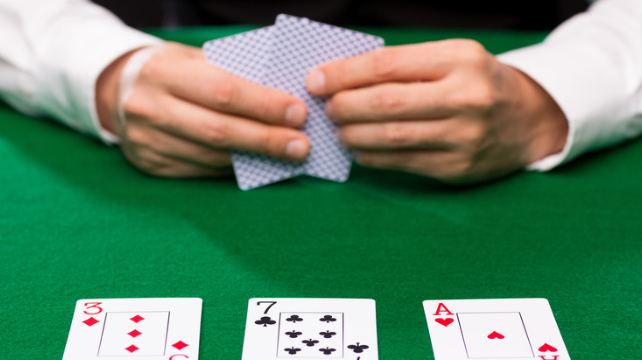Parte do sucesso no pôquer (assim como na vida em geral) é pensar em várias situações com antecedência e decidir como você reagiria. Quando chegar a hora, quer você mude de ideia ou não, você pelo menos já tinha um plano de ação em mente de antemão.
Então, o que você faria nesta situação?
O jovem e agressivo jogador a dinheiro ao seu lado não está fazendo um bom trabalho protegendo sua mão. A maneira como ele olha para as cartas torna muito fácil ver o que ele tem. Você silenciosamente o avisa para ter cuidado, mas ele apenas ri e diz para você se preocupar com seu próprio jogo. Você continuaria olhando as cartas dele quando tivesse uma chance? E você acha que isso é uma forma de trapaça, se você
olhar ? Por que ou por que não?
Você pode ganhar 10 fichas VIP com uma resposta atenciosa e de qualidade a este tópico.
Well, come on, this is a controversial situation, I would say that there is no right or wrong in this situation, and it can be interpreted in two ways, but at the end of this text I will choose one option, both are plausible to understand, and shows the player's intention to play a game without obtaining an advantage, the first question is about the responsibility that each player has to protect their own
hands, where the player should know these rules, in this situation the player is being warned by the opponent , who would have no obligation to do this, but warned him by showing his ethics so as not to gain any advantage from this, in turn the opponent ignored his warning by giving up protecting his hand, exposing it to his field of vision, we will have two situations Here, I can give up not looking at my opponent's cards, thinking about the ethics of not gaining an advantage, or obtaining information from a hand that is completely exposed to me. It is part of poker that you look at your opponent and try to obtain as much information as possible based on their reactions. If my opponent has his cards exposed in my field of vision, I have no responsibility for him not knowing how to protect his cards, making me liable. of any punishment acquired in this case, due to the position of the table being next to that opponent, unfortunately or fortunately I am gaining an advantage over this opponent, and perhaps over others, but I am not being unethical in looking at my opponent, I cannot give up my right to look at his reactions, but his cards are exposed to me, making me see them, unfortunately or fortunately I will continue to have an advantage over him and the opponents at the table, my opponent has given up the right to protect his cards, I am not committing no infraction. Well, my final considerations are these, I will continue looking at my opponent.


















